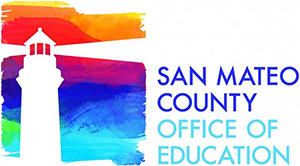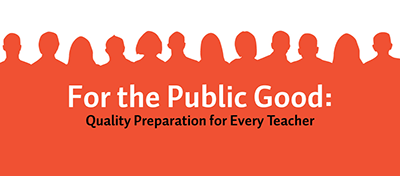19 Dec2016
By Brigid Brennan
The clinical models promoted by the Bank Street Sustainable Funding Project are among the high-quality formats for teacher preparation being studied by AACTE’s Clinical Practice Commission. The study described in this article is not officially connected with AACTE or the Clinical Practice Commission.
The Sustainable Funding Project (SFP) at Bank Street College of Education (NY) seeks educator preparation leaders to participate in a study of clinically rich preparation programs.
Educators agree that sustained preservice clinical practice is essential to ensure teachers enter the classroom well-situated for success. SFP studies how to enable all aspiring teachers to enter the profession through affordable, high-quality programs—programs that include yearlong clinical experiences for teacher candidates—so that every teacher is prepared for the demands of the 21st-century classroom.
06 Dec2016
By Daina Lujan, Eurania Isabel Lopez, Judith Munter and Timothy Weekes
California, like many states in the nation, faces a critical shortage of teachers. As California recovers from the Great Recession, teacher hiring needs have steadily increased from a recent low of 10,360 in 2011-2012 to 21,482 in 2015-2016. During the same period, the number of new credentials issued has decreased to a low of fewer than 14,000 candidates in the 2014-2015 school year. This reduction in productivity is reflective of the downward trend in enrollment in teacher preparation programs.


06 Dec2016
By John E. Clark
The views expressed in this article do not necessarily reflect the views of AACTE.
I’m a high school teacher in Florida. I entered the profession through an alternative certification route after completing a 20+ year career in telecommunications. Beyond my standard college classes, my classroom-based preparation consisted of only 10 days of observation along with the creation and delivery of two practice lessons. I graduated as “highly qualified” and was hired immediately as a science teacher at the local teacher job fair.
If I were entering the profession now, especially coming from the business world, I would want a more effective teacher preparation experience than the one I had 10 years ago. Many experienced educators concur. Hope Street Group’s On Deck: Preparing the Next Generation of Teachers (a report released this spring) was the first study that compiled data collected by teachers from classroom teachers regarding their professional preparation. Along with 17 other National Teacher Fellows, I conducted this peer research, sourcing educators of all tenures who were certified in 49 states plus the District of Columbia. Amid several interesting findings in On Deck, two particularly resonated with me as I also reflect on “what I wish I’d learned then.”
29 Nov2016
By Rodrick Lucero and Tim Finklea

It’s been a busy fall of traveling for the AACTE Member Engagement and Support team as we’ve been visiting campuses to document exemplary clinical partnerships and practices for our online Research-to-Practice Spotlight Series, part of the AACTE Innovation Exchange.
This fall, we’ve been filming at St. John’s University (NY); the University of Nevada, Las Vegas; and California State University, Long Beach. We are also busy scheduling visits with State University of New York at Oswego and Butler University (IN) for spring 2017. At each location, we’ve met with deans, professors, teacher candidates, school district principals, teachers, and PK-12 students to see firsthand how a variety of programs are developing and sustaining successful clinical partnerships. The video production company “Ideas That Breathe” has been a valuable partner for filming, editing, and producing a compelling series from each site we visit. Each series is then segmented into episodes for posting on the Innovation Exchange and highlighting in the Ed Prep Matters blog.
31 Oct2016
By Amanda Lester
Please join me Tuesday, November 15, 1:00-2:00 p.m. EST for the third webinar in this year’s AACTE clinical practice series, “Advancing Science and Math Teaching in Diverse Elementary Classrooms: A Clinical Practice Model at San Francisco State University.”
Presenters Judith Munter, dean of the Graduate College of Education, and Stephanie Sisk-Hilton, associate professor of elementary education, will discuss the clinical preparation model at San Francisco State University (SFSU) centered around ensuring elementary education candidates and practicing elementary educators in their partner schools are highly prepared to teach science and math to an increasingly diverse population.
19 Oct2016
By Nicholas J. Shudak
The views expressed in this article do not necessarily reflect the views of AACTE.
When John Dewey wrote of the need to create an “intimate union” between the university and the elementary school such that each is a laboratory for the other, he was speaking of a need that is still yet to be fully satiated. Today’s increasing prevalence of the residency model, however – supported by a growing body of research and application across diverse settings – is ushering in a new era that offers new promise toward achieving Dewey’s vision.
For Dewey, the intimate union would have the university contributing “to the evolution of valuable subject-matter and right method while the school in turn will be a laboratory in which the student of education sees theories and ideas demonstrated, tested, criticized, enforced, and the evolution of new truths” (Dewey, 1900/1990, p. 93). And although Dewey’s University of Chicago Laboratory Schools flourish as a living instantiation of his intimate union, in many practical ways the ideal has proven elusive.
18 Oct2016
By Courtney Glazer and Diane M. Fogarty
Last week, AACTE’s Clinical Practice Commission (CPC) met to continue its consensus work regarding clinical experiences in teacher preparation. Colorado State University was a gracious host, and the high altitude was matched perfectly by the commission’s high expectations.
After our last meeting in June, commission members had been hard at work reviewing literature, considering exemplars, and drafting pieces of a large research document. Early on at this meeting, we affirmed our belief in the centrality of clinical practice and clinical partnerships for high-quality teacher education programs and practices. In hopes of maximizing the usefulness and traction of our work in the field, we decided to adjust our focus to producing a shorter white paper outlining bold claims and key supporting tenets for successful clinical partnerships and practices. The white paper will be accompanied by several additional pieces of scholarship aimed at different audiences and providing more details.
28 Sep2016
By Zachary VanHouten
Congratulations to the four newest recipients of federal Teacher Quality Partnership (TQP) grants! Coppin State University (MD), North Carolina A&T State University, the University of New Hampshire, and the University of West Alabama will share more than $5 million to improve the preparation of teachers through partnerships with 13 high-need, rural school districts.
The U.S. Department of Education yesterday announced the new 5-year grants, which will be divided among two partnerships with a prebaccalaureate preparation model and two others with residency-based models:
27 Sep2016
By Sarah Pistella
Tampa, Florida, is short 1,000 teachers this year. Nine out of 10 low-income schools have staffing deficits in special education. Across the United States this year, classrooms are in need of 60,000 teachers, and the number could reach 100,000 by 2018. These are among the sobering statistics presented at a national policy forum I attended September 15, sponsored by the Learning Policy Institute (LPI).
The event, “Solving Teacher Shortages: Attracting and Retaining a Talented and Diverse Teaching Workforce,” presented the latest staffing and enrollment data and what they mean for education – ranging from fewer classes and larger class sizes to the hiring of underqualified teachers. Various high-profile speakers explained that shortages are driven largely by attrition of teachers for reasons such as lack of respect and autonomy, poor working conditions, and inadequate pay and administrative support.
15 Sep2016
By AACTE
Today, the Learning Policy Institute released a set of reports that present the latest data on U.S. teacher supply and demand and promote comprehensive recruitment and retention strategies to alleviate persistent shortages. AACTE commends the reports’ attention to the steep cost to students of understaffed schools, particularly in low–income communities, as well as the proposed solutions centered on high-quality clinical preparation of new teachers and reducing the attrition rate among practicing teachers.
School districts across the nation are struggling to staff classrooms with adequate numbers of skilled teachers, forcing them to make tough choices that shortchange students. Many educator preparation programs have stepped up recruitment and developed innovative partnerships with districts to meet local needs. Although these efforts are seeing some success, adjustments to the production end of the educator pipeline cannot compensate for the “leaky bucket” of practicing teachers who, according to the Learning Policy Institute, leave at a rate of nearly 8% per year.
12 Sep2016
By Kristin McCabe
Mark your calendar for a special webinar September 29 about key roles for educator preparation providers (EPPs) in solving the nation’s persistent teacher shortages.
Offered by AACTE in partnership with the Learning Policy Institute (LPI), the webinar will highlight the latest enrollment and staffing data and promising models for programs and policies to improve educator recruitment, preparation, and retention.
26 Jul2016
By Abigail Mercadante
Ed Prep Matters is featuring “Stories of Impact” to showcase AACTE member institutions with educator preparation programs that are making a positive impact in their communities and beyond through innovative practices. We are committed to sharing members’ success stories and encourage you to do the same.
 At Ohio’s Miami University, a partnership program is providing clinical experiences to teacher candidates while supporting at-risk secondary students through highly individualized instruction and mentoring. With a successful track record that mutually benefits all participants, the program’s low price tag and high regard in the community are like icing on the cake.
At Ohio’s Miami University, a partnership program is providing clinical experiences to teacher candidates while supporting at-risk secondary students through highly individualized instruction and mentoring. With a successful track record that mutually benefits all participants, the program’s low price tag and high regard in the community are like icing on the cake.
22 Jul2016
By Rodrick Lucero
 We are excited to announce the second webinar in the AACTE clinical practice series: “Advancing Educator Preparation Through Clinical Practice: The Dean’s Perspective,” to be held August 19, 2:00-3:00 p.m. EDT.
We are excited to announce the second webinar in the AACTE clinical practice series: “Advancing Educator Preparation Through Clinical Practice: The Dean’s Perspective,” to be held August 19, 2:00-3:00 p.m. EDT.
Please join AACTE moderators Tim Finklea and Amanda Lester for a conversation with deans and directors representing five diverse universities as they explore the role clinical practice has played at their institutions through the lens of leadership. The panelists:
11 Jul2016
By Mark LaCelle-Peterson
 Ask any new teacher what part of their preparation was most important, and the answer will almost always be the final clinical component—the student teaching, internship, or residency experience. But while everyone seems to agree that high-quality clinical experience is critical to high-quality preparation, a persistent set of challenges have stood in the way of widespread implementation: identifying excellent clinical faculty, providing adequate time in clinical placements, and helping candidates, particularly those of limited means, navigate the full-time demands of unpaid student teaching or internships.
Ask any new teacher what part of their preparation was most important, and the answer will almost always be the final clinical component—the student teaching, internship, or residency experience. But while everyone seems to agree that high-quality clinical experience is critical to high-quality preparation, a persistent set of challenges have stood in the way of widespread implementation: identifying excellent clinical faculty, providing adequate time in clinical placements, and helping candidates, particularly those of limited means, navigate the full-time demands of unpaid student teaching or internships.
07 Jul2016
By Abigail Mercadante
 Ed Prep Matters is featuring “Stories of Impact” to showcase AACTE member institutions with educator preparation programs that are making a positive impact in their communities and beyond through innovative practices. We are committed to sharing members’ success stories and encourage you to do the same.
Ed Prep Matters is featuring “Stories of Impact” to showcase AACTE member institutions with educator preparation programs that are making a positive impact in their communities and beyond through innovative practices. We are committed to sharing members’ success stories and encourage you to do the same.
The importance of clinical practice in teacher preparation is well known. Increasingly, preparation programs are getting teacher candidates into PK-12 settings earlier and more often to enhance their readiness to enter the field. At Minnesota’s Winona State University, that means building a clinical practice model supported by a state-of-the-art “Education Village” slated to open in spring 2018, pending final state funding.










 At Ohio’s Miami University, a partnership program is providing clinical experiences to teacher candidates while supporting at-risk secondary students through highly individualized instruction and mentoring. With a successful track record that mutually benefits all participants, the program’s low price tag and high regard in the community are like icing on the cake.
At Ohio’s Miami University, a partnership program is providing clinical experiences to teacher candidates while supporting at-risk secondary students through highly individualized instruction and mentoring. With a successful track record that mutually benefits all participants, the program’s low price tag and high regard in the community are like icing on the cake. We are excited to announce the second webinar in the AACTE
We are excited to announce the second webinar in the AACTE  Ask any new teacher what part of their preparation was most important, and the answer will almost always be the final clinical component—the student teaching, internship, or residency experience. But while everyone seems to agree that high-quality clinical experience is critical to high-quality preparation, a persistent set of challenges have stood in the way of widespread implementation: identifying excellent clinical faculty, providing adequate time in clinical placements, and helping candidates, particularly those of limited means, navigate the full-time demands of unpaid student teaching or internships.
Ask any new teacher what part of their preparation was most important, and the answer will almost always be the final clinical component—the student teaching, internship, or residency experience. But while everyone seems to agree that high-quality clinical experience is critical to high-quality preparation, a persistent set of challenges have stood in the way of widespread implementation: identifying excellent clinical faculty, providing adequate time in clinical placements, and helping candidates, particularly those of limited means, navigate the full-time demands of unpaid student teaching or internships.  Ed Prep Matters is featuring “Stories of Impact” to showcase AACTE member institutions with educator preparation programs that are making a positive impact in their communities and beyond through innovative practices. We are committed to sharing members’ success stories and encourage you to do the same.
Ed Prep Matters is featuring “Stories of Impact” to showcase AACTE member institutions with educator preparation programs that are making a positive impact in their communities and beyond through innovative practices. We are committed to sharing members’ success stories and encourage you to do the same.